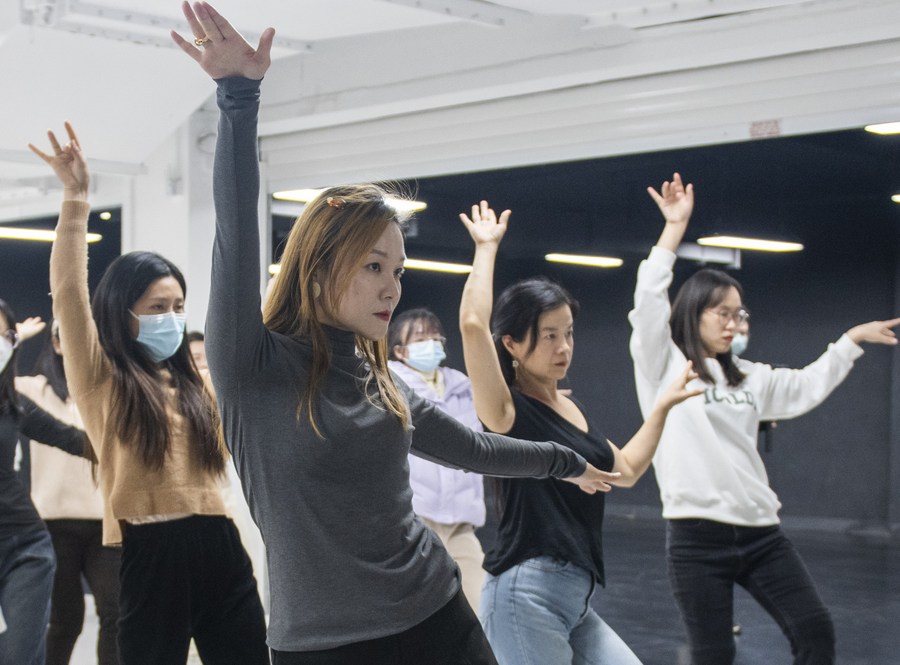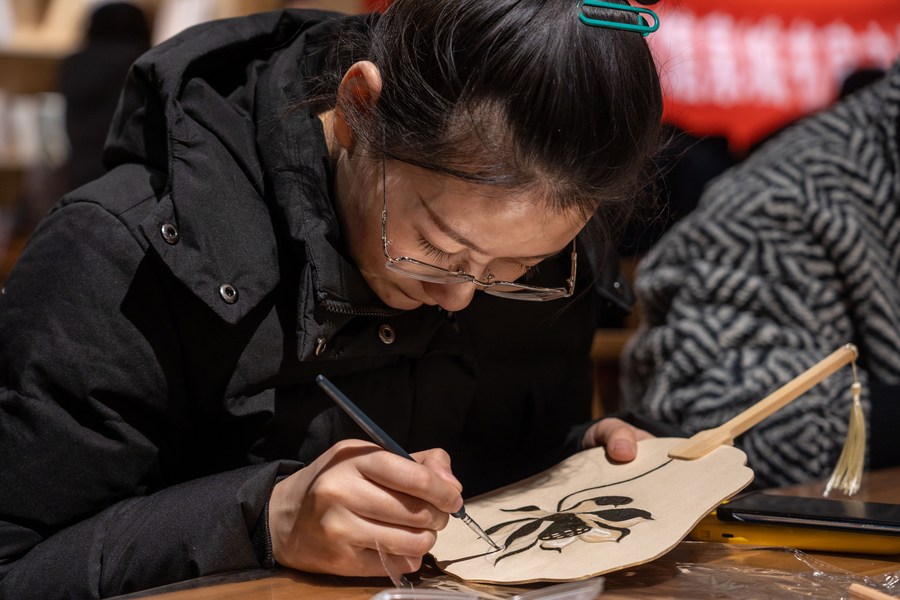* Boasting low tuition fees and diverse interest-oriented courses, night schools are becoming a new fashion among young Chinese.
* The latest fad came to the fore in Shanghai last autumn, when more than 650,000 people reportedly competed for 10,000 spots at the city's night schools.
* Night schools seem to be tapping into a promising intersection where education, entertainment and social lives meet.

Instructor Huang Shasha teaches floral art during a night school class in Wuhan East Lake High-tech Development Zone of Wuhan, central China's Hubei Province, Jan. 14, 2024. (Xinhua/Du Zixuan)
WUHAN/JINAN, Jan. 20 (Xinhua) -- In a room bathed in soft music, Yuan Li took a deep breath to clear her mind and then started drawing repeated circular patterns, an activity of a spiritual and meditative training called mandala art.
A school teacher during the day, Yuan turns into a student at a night school in the city of Wuhan in central China, where she is trying out new hobbies like mandala art and jazz dance, together with her five-year-old son.
"I used to spend evenings watching my son play in the park or take tutorial classes. Now we can experience new things together at the night school," said the 34-year-old single mother.
Yuan represents a growing number of Chinese urbanites who are opting to invest time in night classes -- not notorious exam-oriented prep schools, but institutions that offer diverse interest-oriented courses, from dancing and sports to wine tasting and vlog filming.
Boasting low tuition fees thanks to the heavy involvement of public institutions, such night schools are becoming a new fashion among budget-conscious young Chinese, who are leveraging such classes to acquire new skills, new hobbies, and new friends.

Students learn jazz dance during a night school class in Wuchang District of Wuhan, central China's Hubei Province, Dec. 14, 2023. (Xinhua/Du Zixuan)
COST-EFFECTIVE LEARNING
Many Chinese people would associate night schools with the evening lectures started by universities in the 1980s, mostly to impart technical knowledge or offer college diplomas to middle school graduates. Such utilitarian institutions, however, were gradually phased out with the popularization of higher education.
The latest fad came to the fore in Shanghai last autumn, when more than 650,000 people reportedly competed for 10,000 spots at the city's night schools, a level of interest that once caused the enrollment platform to crash.
Data provided by Shanghai's Citizen Night School for Arts showed that popular courses such as Shanghai dialect and handmade leatherware classes were sold out within ten seconds, while more than 300 courses were snapped up in the course of just an hour.
"The last time I vied for something so fiercely was when I tried to book holiday train tickets," said Lu Tian, a Shanghai resident, who failed to get a spot for a Shanghai dialect course.
For Lu, the low cost of night school courses is the biggest attraction. "You get 12 lessons for only 500 yuan (70 U.S. dollars). So each 90-minute class is about the price of two cups of coffee, while at other art schools the price can be 300 to 500 yuan per class," she said.
Inspired by the success achieved in Shanghai, night schools quickly sprang up in other Chinese cities. On the basis of surveys and questionnaires, the Wuhan municipal committee of the Communist Youth League of China has launched 15 night schools since last November, all free of tuition fees.
Many night schools use public and communal facilities that are idle at night, and they invite teachers from local colleges to ensure quality, while keeping the cost low.
"Our night schools are all located in public facilities, such as the Wuhan Youth Palace, service centers of residential communities and youth service centers, so we don't need to pay rent," said Wei Chao, a Communist Youth League official in Wuhan.

Instructor Wang Kuolin (1st L) teaches students how to play the ukulele during a night school class in Hanyang District of Wuhan, central China's Hubei Province, Jan. 10, 2024. (Xinhua/Du Zixuan)
UNSATIATED DEMAND
In Linyi in the eastern province of Shandong, the municipal library recently opened its first pottery-making night class, drawing a large number of applications. The classroom is often so crowded that staff members need to borrow desks from other rooms to accommodate all the students.
"Many of our students are young adults aged around 30, who face a lot of pressure at work and are in need of new experiences to light up their spiritual worlds," said Yue Mengyu, the library's vice curator.
"I feel relaxed when I focus on this handcraft, and it relieves my mind from the hectic pressure at work," noted Gao Yang, a 35-year-old resident of Jinan, capital of Shandong. She enrolled in a night school to learn to make decorative items using melted tinfoil paper, an intangible cultural heritage.

A citizen learns to decorate a fan using tinfoil paper at a night school in Jinan, east China's Shandong Province, Jan. 11, 2024. (Xinhua/Zhu Zheng)
Apart from offering after-work relaxation, many night schools seem to be tapping into a promising intersection where education, entertainment and social lives meet.
For Wang Hehe, a 27-year-old currently taking a gap year, her night school in Wuhan is a place to make new friends. "As I'm neither working nor studying, I spend most of my time alone. Here I feel connected, and chatting to people with similar hobbies is proving a lot of fun," she said.
Some learners are keen to improve their work skills, leveraging the institutions' competent teachers. Yang Chaowen, a 22-year-old barista in Wuhan, arrived at the latte coffee course half an hour in advance, hoping to get one-on-one tutoring.
"The teacher is renowned in our industry, so I hope to get his personal instruction before the class begins," he said.
Wang Zhongwu, a sociology professor with Shandong University, said education in China used to focus on children and the elderly, leaving young working adults with few options for self-study. "It is this unsatiated desire of young people to improve themselves and enrich their cultural lives that has fueled night school fever," he said.
"Night schools need the joint efforts of all sectors of society if they are to enjoy long-term success. With more and more night schools popping up, local governments should build platforms to integrate resources, keep a check on the state of schools and provide relevant information," said Wang.
(Reporting by Yue Wenwan, Yao Yuan, Du Zixuan, Zhang Xinyi, Xiong Xianghe, Zhang Wuyue; Video reporters: Feng Yuanyuan, Wu Feizuo, Xiong Xianghe, Yue Wenwan, Du Zixuan; Video editors: Hong Ling, Liu Xiaorui, Wang Han, Ma Ruxuan)■












